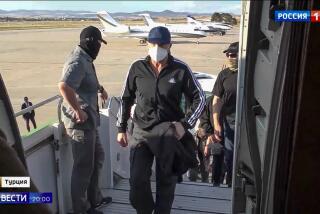East and West Germans Trade Total of 8 Spies
- Share via
BONN — A major spy swap between East and West Germany took place Wednesday, officials here disclosed.
West German officials indicated that four East German spies were exchanged for an equal number of West German agents held by the East.
The exchanges occurred at a border crossing point between the two countries at Herleshausen in the central part of the frontier.
According to the officials, among those traded was imprisoned East German agent Lothar Lutze, 44, a reputed “super-spy” who has been serving a 12-year prison sentence in West Germany.
Stole 600 Sensitive Papers
While working in the West German Defense Ministry, Lutze stole more than 600 sensitive documents involving some of the most closely held secrets of the North Atlantic Treaty Organization.
The information he gave to the East Germans and their Communist supporters in the Kremlin was said to include various aspects of NATO’s defense plans as well as specifications for various armaments, including main battle tanks, that were to be introduced into the West’s armory in the years ahead.
Lutze was arrested in 1976 and convicted of espionage and sentenced to prison in 1979. His wife, Renate, who had worked as a secretary in the Defense Ministry, was also convicted of spying and sentenced to six years. She was released in an exchange of spies in 1981.
Two Important Agents
The other three East German spies reportedly included two important agents--Otto-Friedrich Schweikhardt and a confederate, Alois Tomaschek. The fourth agent held by the West Germans was not identified.
The four West Germans who were involved in the swap are said to include two agents from the Secret Intelligence Service, which operates abroad, and two others from the counterintelligence service, whose headquarters are in Cologne.
The exchange of captured agents between East and West Germany have become a fairly regular occurrence, since each side has a vast network of spies working on either side of the border, with several arrests and convictions made each year.
The East Germans are known to encourage their spies by promising that every effort will be made to get them back home even if they are arrested, convicted and imprisoned in the West.
Lutze was thought to have been intended as part of a prisoner exchange that occurred in West Berlin in February, 1986. That swap included Soviet dissident Anatoly Shcharansky, who had been released by the Soviets for an exchange across the Berlin border.
Shcharansky, who has since emigrated to Israel and adopted the Hebrew form of his name, Natan Sharansky, was released at the Glienicke Bridge between West Berlin and Potsdam along with several agents from both sides. Lutze, however, was not included at the time--because, it was said here, prosecutors wanted him to serve a longer period of his sentence.
Growing Detente
Some West German commentators suggested Wednesday that these periodic exchanges are part of a growing detente between the two Germanys.
West German Chancellor Helmut Kohl has publicly complimented Soviet leader Mikhail S. Gorbachev’s new efforts at reform in the Soviet Union.
And several senior West German federal government and state officials were seen recently shaking hands with East German leader Erich Honecker at East Germany’s semiannual Leipzig trade fair.
Similarly, two senior East German officials are currently attending the West German trade fair in Hanover.
Whether or not their presence in West Germany contributed to Wednesday’s exchange of spies was not learned. However, most commentators said that there appears to be a softening in the current relations between East and West Germany.
More to Read
Sign up for Essential California
The most important California stories and recommendations in your inbox every morning.
You may occasionally receive promotional content from the Los Angeles Times.








